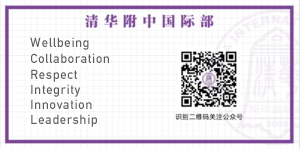
向左滑动查看全文英文
Swipe to the left for English version
闭门研讨会
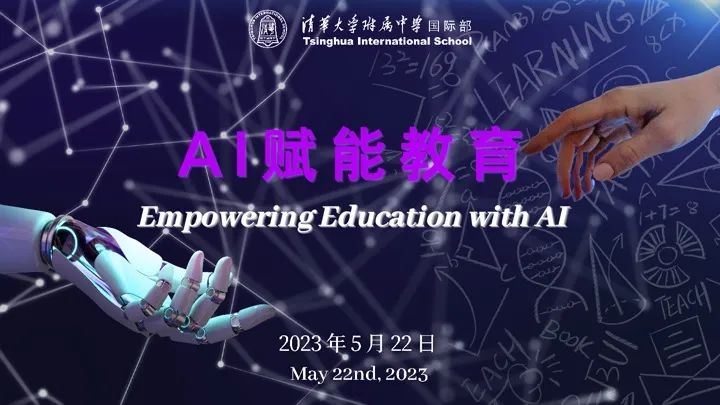
随着人工智能的高速发展,人工智能正在对各个领域产生着方方面面的影响。人工智能为教育带来了怎样新的机遇和挑战?人工智能又如何赋能教育?5月22日,清华附中国际部顺利召开主题为“人工智能赋能教育”的闭门研讨会,汇聚业界专业大咖,针对人工智能与教育的话题展开深入而充分的研讨,为参会的各位老师和同学们带来富有洞见与启迪的讨论和分享。
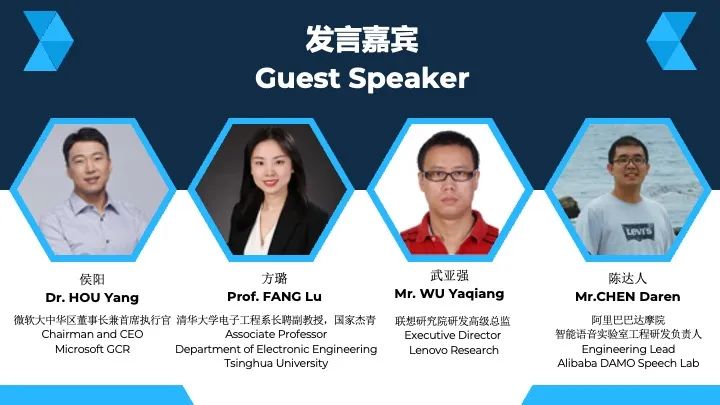
主讲发言嘉宾
本次研讨会的主要内容有三项,分别为主讲人发言,圆桌讨论和自由研讨环节。受李文平校长特别邀请出席本次研讨会并担任主讲人的嘉宾有:联想研究院研发高级总监武亚强先生,阿里巴巴达摩院智能语音实验室工程研发负责人陈达人先生,清华大学电子工程系长聘副教授方璐女士和微软大中华区董事长兼首席执行官侯阳先生。四位嘉宾在主讲环节分别发表主旨演讲。会议由国际部中方副校长白文婷女士主持,国际部李文平校长致开场词。
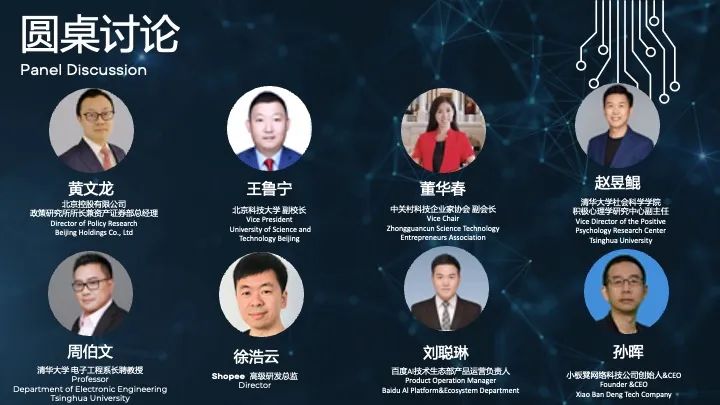
圆桌讨论专家
受邀参加圆桌讨论会议的专家学者有:百度AI技术生态部产品运营负责人刘聪琳先生,清华大学电子工程系长聘教授周伯文先生,清华大学社会科学学院积极心理学研究中心副主任赵昱鲲先生,小板凳网络科技公司创始人和CEO孙晖先生,北京科技大学副校长王鲁宁先生,中关村科技企业家协会副会长董华春女士,北京控股有限公司,政策研究所所长兼资产证券部总经理黄文龙先生和Shopee高级研发总监徐浩云先生。
圆桌讨论的主要议题围绕LLM爆发后对各个行业的影响和变化、AI赋能教室是怎样的、AI融合教育的优势与特征、AI出现后学生学习目标如何“升级”以及学术诚信问题等话题,讨论话题由校内的老师和同学们共同提出并收集而来。
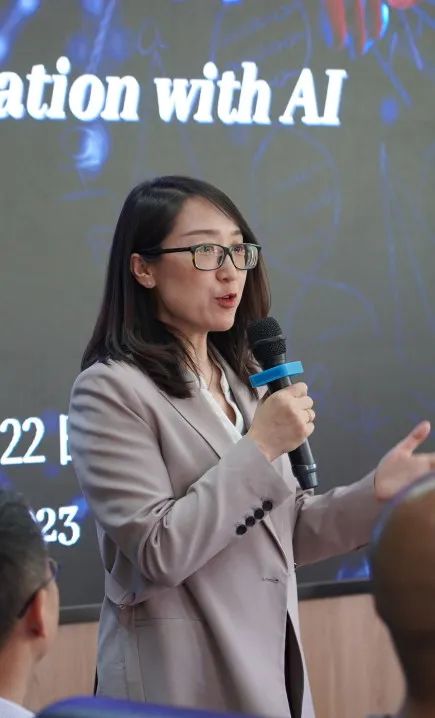
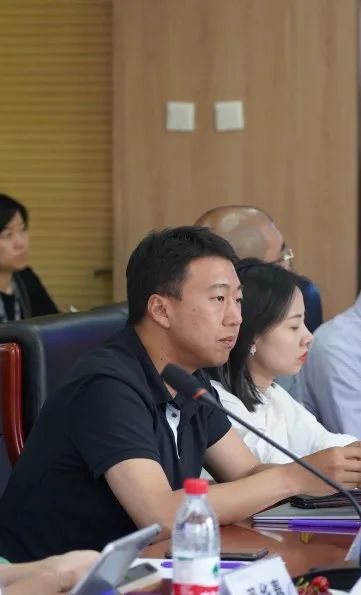
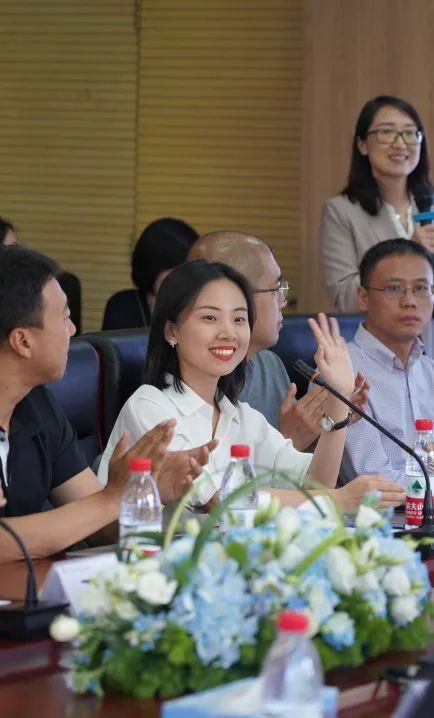
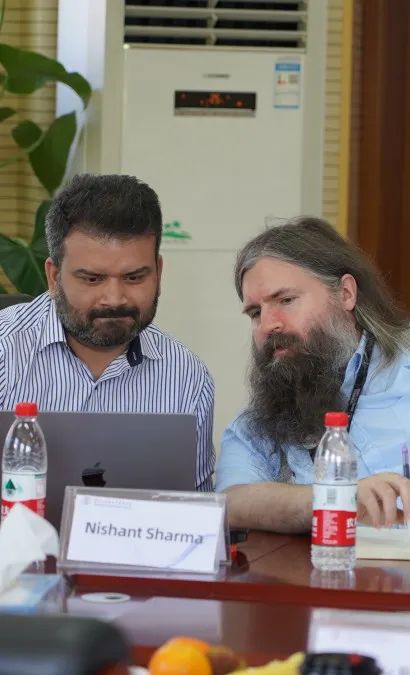
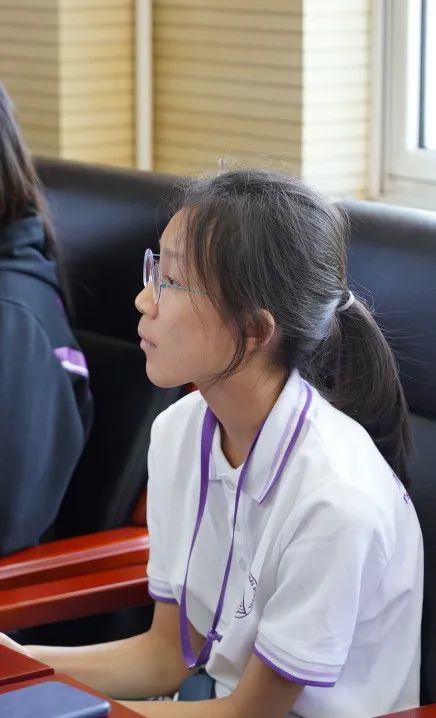
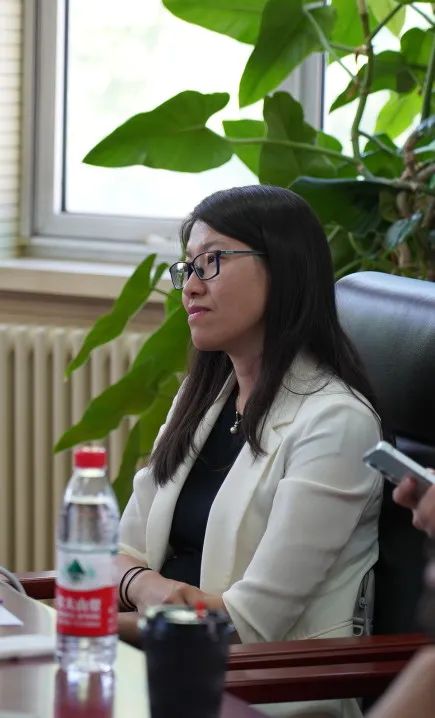
本次会议大咖云集,各位专家、学者从自身行业和专业角度分享了最前沿的人工智能发展现状,并结合AI与教育之间的融合,带来一场场令人大开眼界,同时又阐发无限思考的演讲。参加本次会议的主要为国际部的学生、老师和家长,主讲人和圆桌研讨嘉宾也多数为学生家长。研讨会现场气氛热烈,掌声雷动,精彩不断!
01
开场致辞
Opening Remark
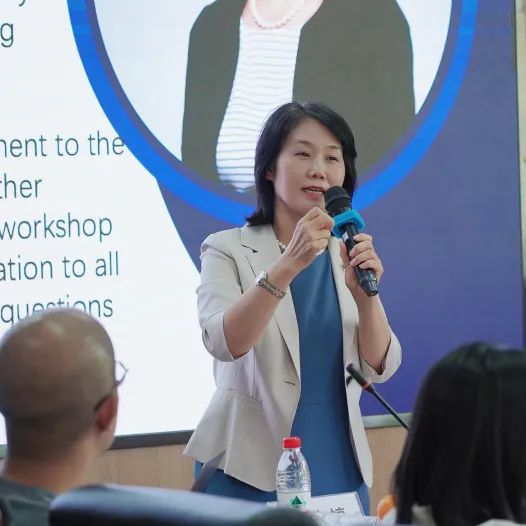
李文平 清华附中国际部执行校长
在开场致辞中,国际部执行校长李文平女士提出,在人工智能时代已经到来的今天,教育将如何被AI影响?我们应该如何应对新变化和新挑战?这些话题已然成为教育工作者和学校迫切需要讨论的。
3月初,戴琼海院士和方璐博士带来的人工智能讲座为老师和同学们点燃了科学的激情,拓宽了对于人工智能的理解。在学校里,数学老师龙宇清自主研究大语言模型与教育的相关课题,并与老师们一起成立了“人工智能委员会”,进行了有关学术诚信和人工智能与教学应用的相关研究。11年级学生Michael Wang自主开发了一款名为“AI Note taker”的应用程序,借助它可以在阅读科研报告或学术文章时,实现快速提取文本和主旨大意的功能。
鉴于以上所提到的,在李校长惊叹学生和老师们的自主性和创造力的同时,也在思考,主动学习人工智能,积极拥抱变化,创新教育思维,才是作为清华人的担当。教育是面向未来的,如何为教师和学生赋能,如何将人工智能更好地融入教学,如何利用人工智能加快构建更加开放、灵活的教育体系,这些是教育工作者未来要探索的方向。
02
主讲人主旨演讲
Openingn Presentations
联想研究院研发高级总监
武亚强
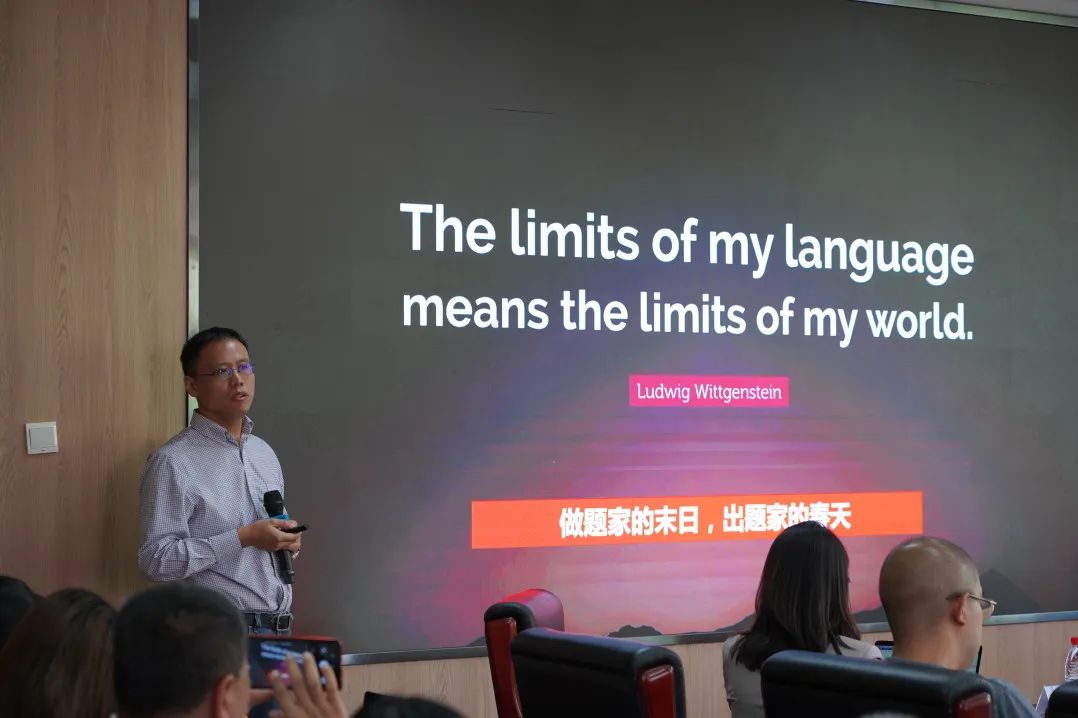
武亚强先生的演讲主题为“大语言模型时代下的人工智能与教育”。武先生详细地介绍了大语言模型的背景,以生动的案例介绍了大语言模型目前的功能,并在最后提出了人工智能教育的应用,其中包括现在教育行业与GPT的应用情况等。武亚强先生提出,人工智能时代,一个教师就是一个教研团队,在未来,“教、学、管、评、测、考”的各个环节都可以在人工智能的辅助下由一个人来完成。人工智能时代,是“做题家的末日,出题家的春天”,我们更应该注重培养学生的思维能力,而传统的做题模式不足以提升学生的思维能力。
阿里巴巴达摩院智能语音实验室
工程研发负责人
陈达人
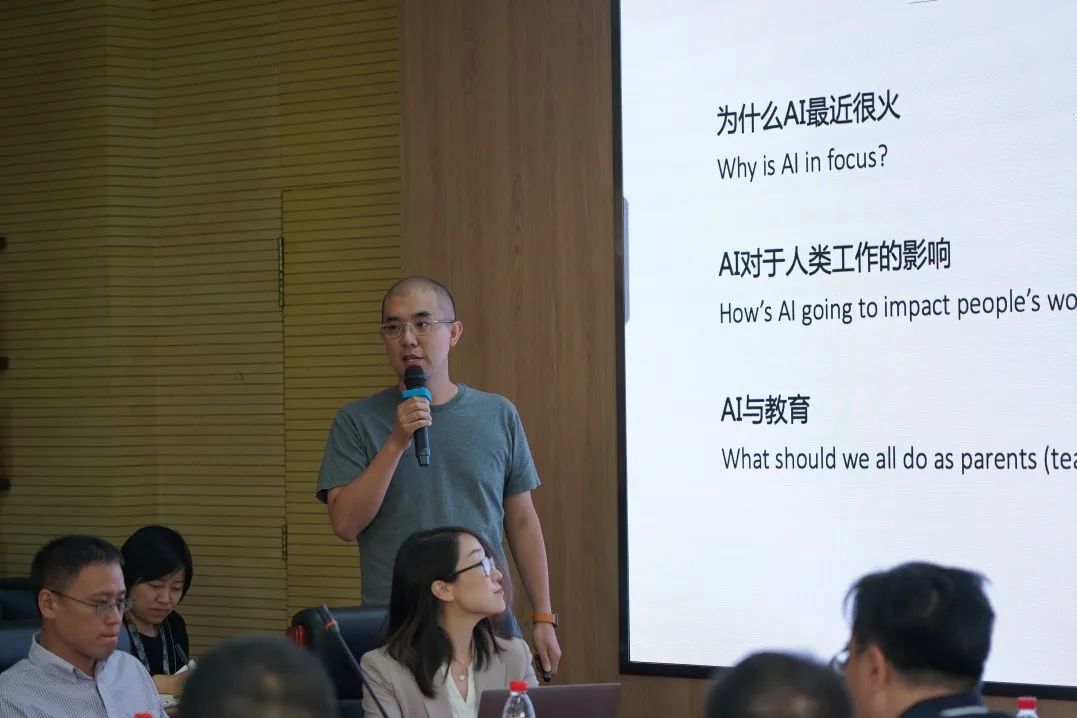
陈达人先生的主题演讲为“AI漫谈”,从AI的爆发式增长,AI对于人类工作的影响和AI与教育三方面做了分享。陈达人先生引用陆奇博士的“我的大模型世界观”,向与会听众们介绍了三个范式的发展过程和未来进化方向。同时,他分析了暴露GPT风险职业和对未来职业内容的影响。
对于人工智能与教育,他提出,家长应该将AI的出现当成一个机会,而不是威胁。家长应该尽早的接触和使用人工智能,在教育孩子的过程中可以和孩子一起接触和探索AI,并且在过程中辅助和引导孩子,还孩子心中种下种子。
清华大学电子工程系长聘副教授
方璐
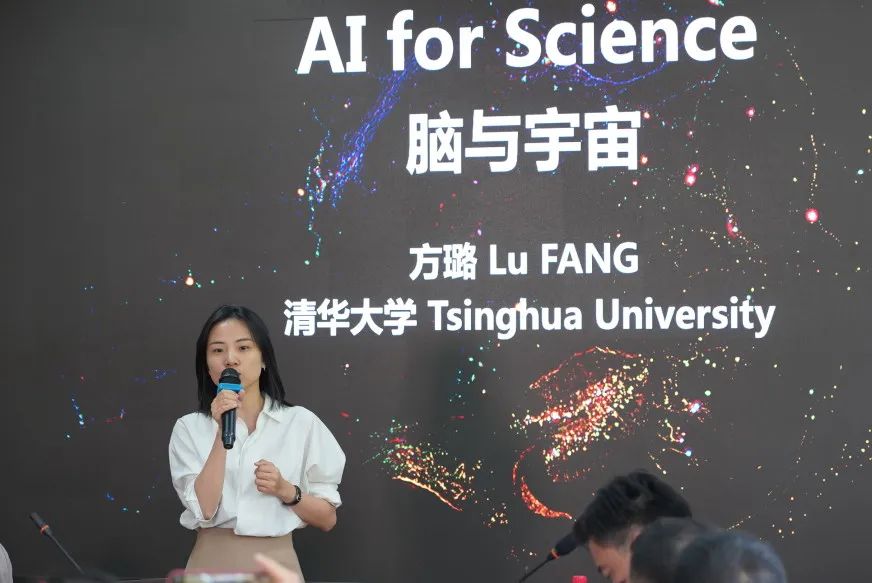
方璐博士的演讲以“脑与宇宙”为题,针对脑科学、天文探测和宇宙探索,从科研工作者的角度分享了人工智能与科学研究之间的关系,以及我们如何与AI共存的话题。方璐博士提出,人工智能时代来临后,单纯的知识获取已经不再重要。未来人类的学习是“AI+3C”的模式,“3C”指好奇心(Curiosity),创意力(Creativity)和约束力(Constrain)。学会提问,更多的培养学生更高的抽象层面的思维能力,并谨慎应对AI的安全和规则问题,这些将变得非常重要。
微软大中华区董事长兼首席执行官
侯阳
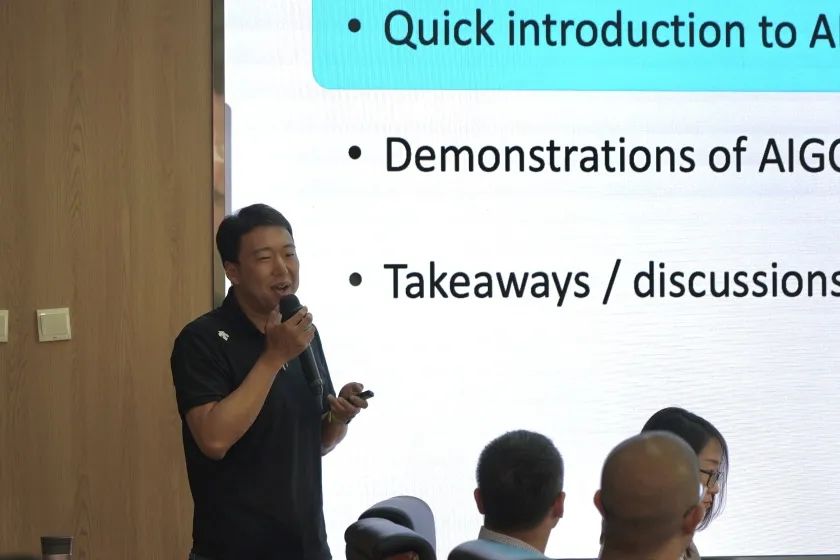
侯阳先生发表题为“生成式人工智能时代与教育行业”的演讲。侯博士介绍了生成式人工智能的发展现状与前景,以及其相应在教育领域的应用,例如数字人讲师等,并展示应用样本案例。针对人工智能和教育的主题,侯阳博士提出,AI时代真正到来,大模型已经具备今天优秀大学毕业生的知识水平。过去传统意义上的知识学习或技术带来的能力差别和门槛将大幅度降低,甚至不复存在。
在心态上和战略上,我们必须要全面拥抱AI而不是限制/抵制AI,教师和学生都需要学习和使用AI赋能的工具来提升效率。如何更好的培养未来10-20年的新型人才?其中,有发现和提出问题的能力,有同理心和道德感,以好奇心和使命感驱动成长,身心健康,内心有幸福感,这些也许是关键的要素。
03
圆桌研讨
Panel Discussion
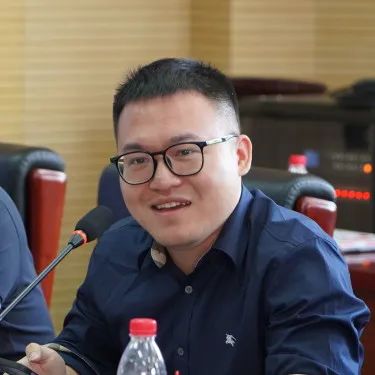
刘聪琳
百度AI技术生态部产品运营负责人
我工作所在的部门就是把技术和生态的转化做好,面向学校,我们可以通过竞赛的手段,把新技术跟同学们目前的学习、实践以及成长结合起来。希望未来能够跟清华中附中国际部一块来打造一些很好的竞赛,以“课、赛、营、展”的模式,通过比赛来与学生做交流。
周伯文
清华大学电子工程系长聘教授
我们要更重视孩子的创造性,人机的协同与交互,还有终身学习和批判性思维的能力。有两个开放思考题留给同学们:GPT的价值观从哪里来?它给出的答案是创造还是剽窃?
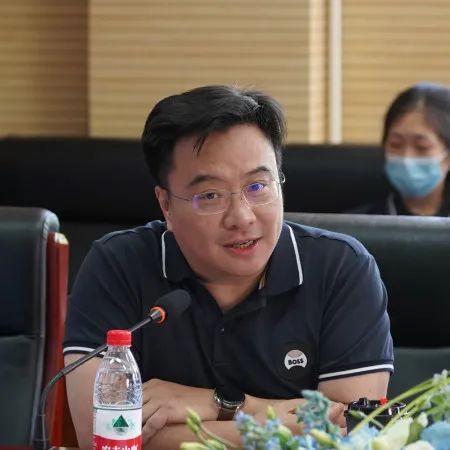
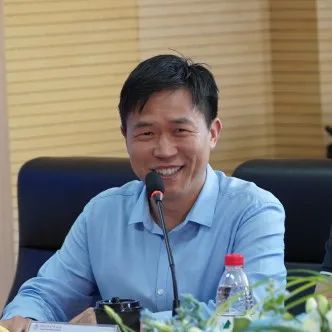
赵昱鲲
清华大学社会科学学院
积极心理学研究中心副主任
在认知层面,AI很快会超过人类,因此,我们更要培养我们孩子的三样东西,身体、情感和社交,尤其是在中小学阶段。人在未来可能更加要思考我们“人”到底是什么,也就是我们怎么样过好这一生。
孙晖
小板凳网络科技公司
创始人&CEO
我们对孩子的培养要更转向“以人为本”。想要让自己和孩子不被AI替代,我们就要去拥抱变化,强大自己,顺应时代的变化,培养孩子的与人沟通能力,社交能力,共情能力等,真正做到“以人为本”。
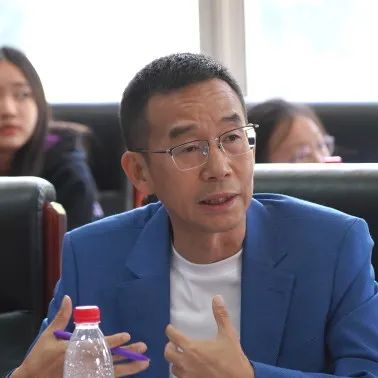
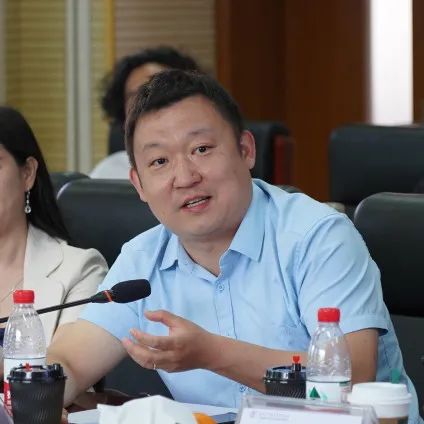
王鲁宁
北京科技大学副校长
大学生已经在使用AI“挑战”现有的教育模式和学习方式了,所以可能在未来,学会有效的高效学习,在最短的时间内抓住一个新领域内最需要你掌握的知识,可能会成为一个必备的技能。
董华春
中关村科技企业家协会副会长
我想留给孩子们三个词:小我,大爱和连接。成长出一个有良好世界观、价值观和道德感的小我,再出于对世界的爱和人类的推动去创新和创造,实现大爱,并学会如何与AI、他人、社会连接,将我们创造的东西与后人连接,超越时空。
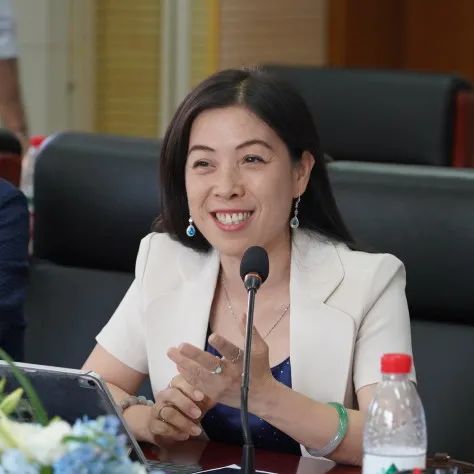
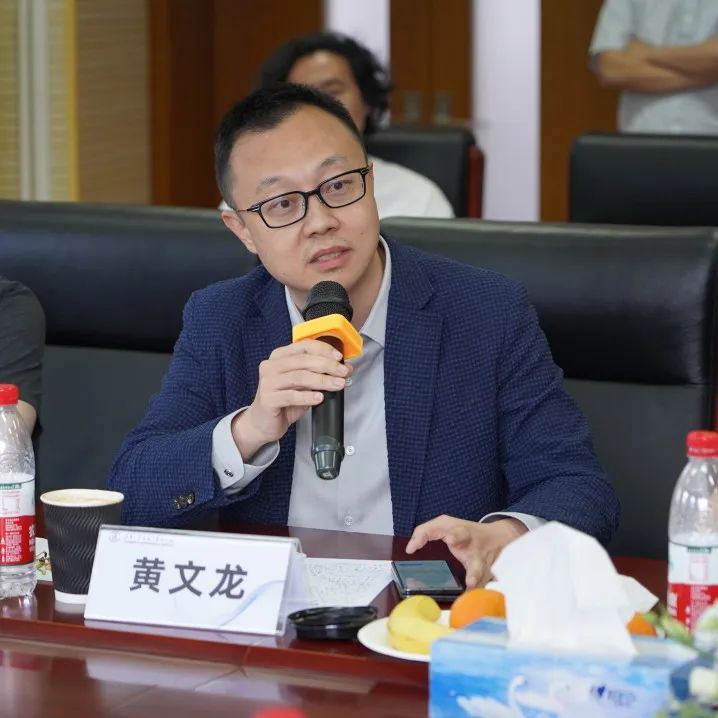
黄文龙
北京控股有限公司,政策研究所所长
兼资产证券部总经理
在教育中,AI所替代不了的,是人的情感教育,这就需要有爱心、同理心的教育工作者,培养孩子真正成为一个对人类进步有帮助的人。
徐浩云
Shopee高级研发总监
未来的人才将会是创造力更强的顶尖科学家、艺术节和企业家。这样的人才需要具备判断力,创造力,好奇心,精准的语言表达能力,同时也需要批判性思维,探究精神和行动力。作为父母,我们需要告诉孩子AI工具使用的道德规范,培养责任心,借助AI和数据体系,帮助孩子找到能够真正幸福的方向。
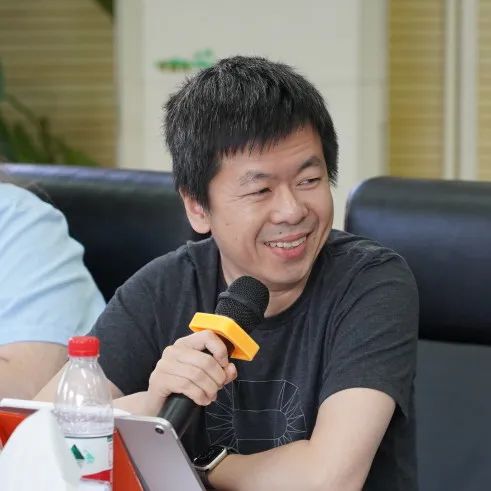
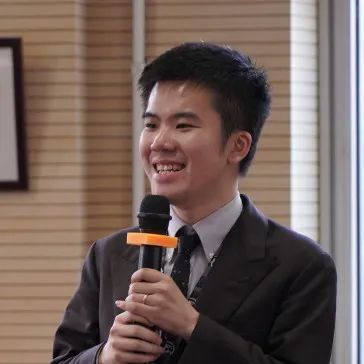
龙宇清 国际部数学教师
清华附中的教育宗旨是为未来领袖人才奠基,所以我们不仅要看现在学生要学会什么,更要看在未来学生应该拥有什么样的技能和特点。我们的教学工作应该更加注重培养学生真正的创新思考能力,同时,学生与人交往的能力和身心健康将被摆在一个更加突出位置上。
04
自由研讨
Free Discussion
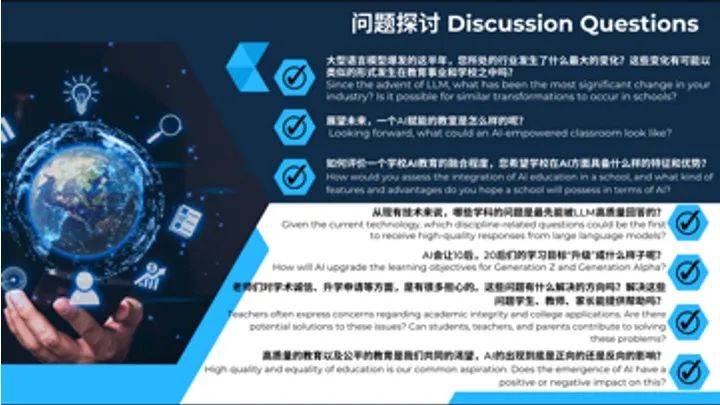
在自由研讨环节,国际部的家长和同学也抓住机会,分享自己针对以上讨论话题的看法。其中国际部的学生代表向在场的专家提问,AI的出现对创造一个更公平的教育的影响是更有利的还是有害的?学生的提问引发了现场嘉宾的热烈回应,在鼓励学生提问和质疑精神的同时,从不同专业的角度提供给学生了广泛的思考空间。
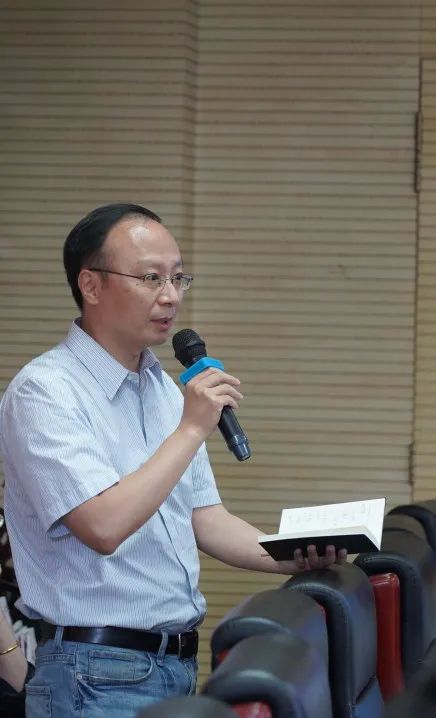
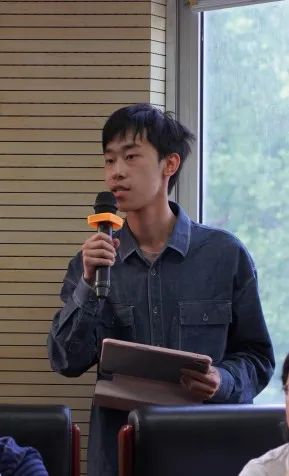
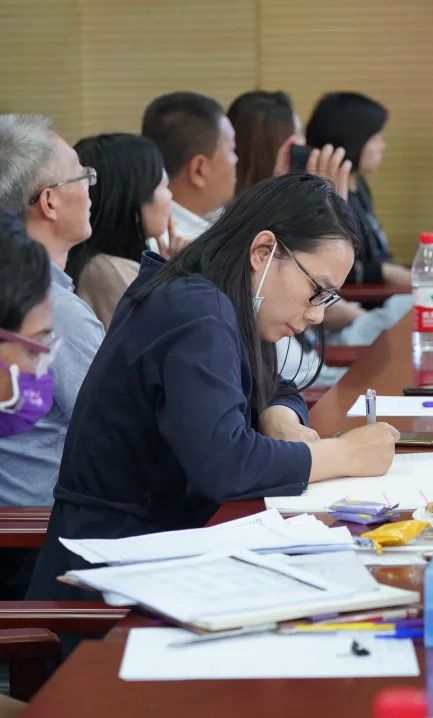
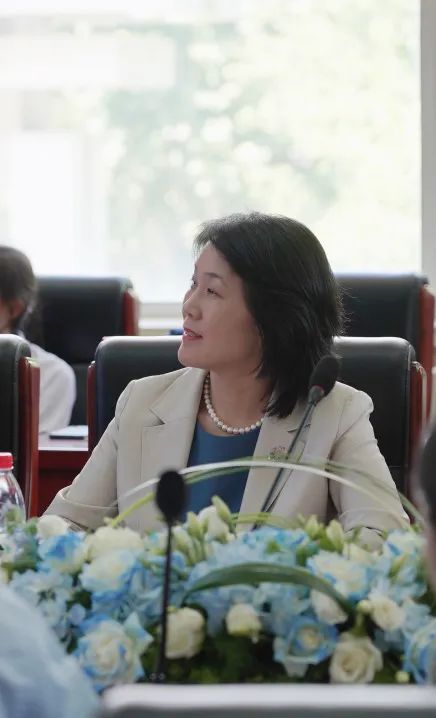
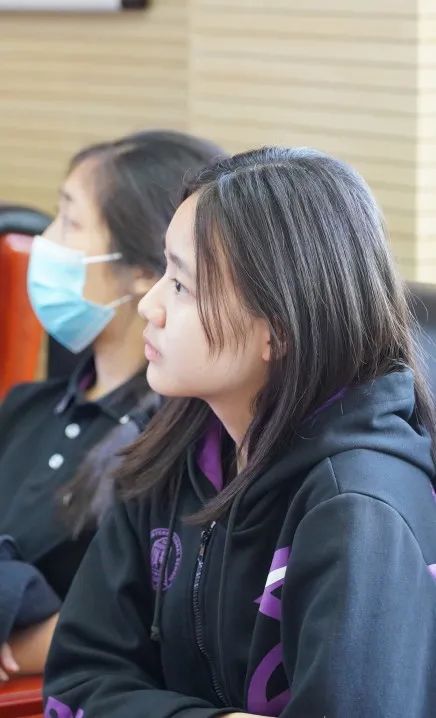
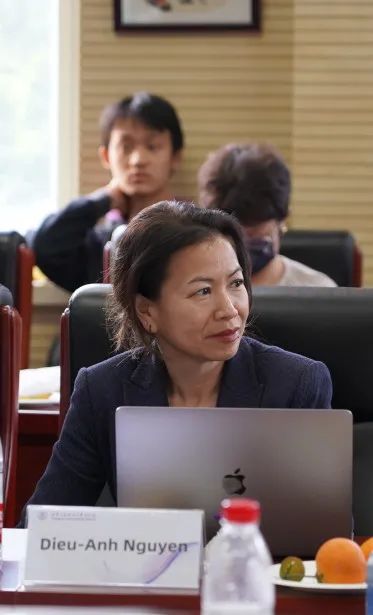
AI & Education
本次“人工智能赋能教育”主题研讨会在气氛热烈、灵感迸发的讨论中圆满结束。李文平校长表示,各位专家学者、老师、家长和学生们的分享都精彩纷呈,干货满满,参会者都受益匪浅,意犹未尽。未来,我们将持续深入探讨,以更好地应对人工智能时代的未知,为教育带来更多可能。未来已来,拥抱未来,让我们共同培养身心健康,独立思考,勇于探索创新的面向未来的人才!

Closed-Door Seminar

With the rapid development of artificial intelligence (AI), AI is the hot topic of the day. Its influence has become widespread, so naturally, the question for THIS to ask is “what new opportunities and challenges will AI bring to education?”
On May 22nd, our school brought together industry professionals to share their insights about AI, to discuss the impact it has already made, and to outline considerations for future dialogue between parents, school administrators, teacher and students.

Guest Speakers
The closed-door seminar, hosted Ms. Wenting Bai, THIS Chinese Vice Principal, consisted of 3 main parts – opening presentations, roundtable dialogue, and free discussion. Invited by Principal Wenping Li, our esteemed speakers included Mr. Yaqiang Wu, Senior Director of R&D, Lenovo Research Institute, Mr. Daren Chen, Head of Engineering R&D, Smart Voice Lab, Alibaba Dharma Institute, Dr. Lu Fang, Associate Professor of Department of Electrical Engineering, Tsinghua University and Dr. Yang Hou, Chairman and CEO of Microsoft Greater China.

Panel Discussion Speakers
The panel of experts and scholars were: Mr. Conglin Lin, Head of Product Operation, Baidu AI Technology Ecology Department; Mr. Bowen Zhou, Tenured Professor of Department of Electrical Engineering, Tsinghua University; Mr. Yuqun Zhao, Deputy Director of Positive Psychology Research Center, School of Social Sciences, Tsinghua University; Mr. Hui Sun, Founder & CEO of Little Bench Network Technology; Mr. Luning Wang, Vice Principal of University of Science and Technology Beijing; Ms. Huachun Dong, Vice Chiarman of Zhongguancun Technology Entrepreneurs Association; Mr. Wenlong Huang, Director of Policy Research Institute and General Manager of Asset Securities Department, Beijing Holding Company Limited; and Mr. Haoyun Xu, Senior R&D Director of Shopee.
Key topics jointly proposed by THIS teachers and students for the roundtable revolved around the impact and changes of LLM (Large Language Models) on various industries, what AI-enabled classrooms look like, the characteristics of AI-integrated education, how to “upgrade” students’ learning goals, and challenges that come with new technologies such as academic integrity issues.






The seminar was full of great experts, sharing the thoughts on the most cutting-edge artificial intelligence development status from their professional point of view. Combining with the integration between AI and education, they together brought an eye-opening and infinite thought-provoking speeches. Representatives of THIS students, teachers and parents participated in this seminar and most of the speakers in the opening presentations and roudtable panel are THIS parents. The seminar was filled with applause, excitement and sparks of thoughts.
01
Opening Remarks

Wenping Li THIS Executive Principal
To kick off the seminar, Ms. Wenping Li plainly announces the era of AI has arrived, “how education will be affected by it and how we should respond to the new changes and challenges as educators and also as schools” is now an urgent topic.
Previously offered lectures about AI from by Academician Prof. Qionghai Dai and Dr. Lu Fang ignited the passion for science and broadened the understanding of AI for THIS teachers and students. THIS Math teacher Mr. Yuqing Long had written a white paper about LLM and education. An “AI Committee” had been formed to help the school review it practices as it relates to AI. Michael Wang, an 11th grader, had recently developed an application called “AI Note taker” to quickly extract text and main ideas when reading research reports or academic articles.
While Principal Li marveled at the autonomy and creativity of students and teachers, she also pondered the role of Tsinghua to actively learn AI, to actively embrace changes, and, in turn, to innovate educational thinking. How will we empower teachers and students? how will we better integrate AI into teaching? How will we use AI to accelerate the construction of a more open and flexible education system? These are the questions for our forward-thinking educators to explore.
02
Opening Presentations
Mr. Yaqiang Wu
Senior Director of R&D, Lenovo Research Institute

Mr. Yaqiang Wu’s “Artificial Intelligence and Education in the Era of Big Language Model” introduced the background of Big Language Model in details. He introduced the current functions of Big Language Model and proposed applications of AI in education, including the current application of GPT in the education industry. All aspects of “teaching, learning, management, assessment, testing and examination” can be completed by one person with the assistance of AI. In the era of AI, it is “the end of the question answerer and the spring of the question writer”, we should pay more attention to cultivating students’ thinking ability, and the traditional model of answering questions is not enough to improve students’ thinking ability.
Mr. Daren Chen
Head of Engineering R&D, Smart Voice Lab, Alibaba Dharma Institute,

Mr. Daren Chen’s presentation mainly shared three aspects: the explosive growth of AI, the impact of AI on human work and AI and education. Quoting Dr. Qi Lu’s words from “My Big Model Worldview”, Mr. Chen introduced the development process of the three paradigms and the future evolution direction to the audience. Meanwhile, he analyzed the exposure of GPT risk occupations and the impact on future career content. For AI and education, he suggested that parents should treat the emergence of AI as an opportunity, not a threat. Parents should be exposed to and use AI as early as possible. They can touch and explore AI with their children and assist and guide them in the process as well as to plant seeds in their children’s hearts.
Dr. Lu Fang
Associate Professor of Department of Electrical Engineering, Tsinghua University

Dr. Fang Lu’s presentation entitled “AI for Science” shared scientific research and how we can co-exist with AI from the perspective of a scientist and a researcher, focusing on brain science, astronomical exploration and cosmic exploration. Dr. Fang Lu suggested that after the advent of AI era, simple knowledge acquisition is no longer important. The future of human learning is the model of “AI + 3C”, “3C” refers to Curiosity, Creativity and Constrain. It will be important to learn to ask questions, to develop students’ ability to think at a higher level of abstraction, and to be careful about the safety and rules of AI.
Dr. Yang Hou
Chairman and CEO of Microsoft Greater China

Dr. Yang Hou gave a presentation titled “Generative AI Era in Education”. Dr. Hou introduced the development stages of AI, the current situation and prospects of generative AI, and its corresponding applications in education, such as digital human tutors, and showed examples of application videos. In response to the seminar theme, Dr. Hou suggested that the big models already have the knowledge level of today’s excellent university graduates. In the next 5-10 years, AI will accelerate its development and show capabilities that may not be imagined today. The difference in ability and threshold brought about by learning knowledge or technology in the traditional sense in the past will be significantly reduced or even cease to exist.
In terms of mentality and strategy, AI must be fully embraced rather than restricted/resisted. Both teachers and students need to learn and use AI-enabled tools to improve efficiency such as chatGPT/Github copilot for improving the programming and writing code process and to help do more application creation. Also, for students with spare capacity, they should master interacting with models and creating training models. Dr. Hou also threw out the question – how do we better train new talents in the next 10-20 years? How do we teach or nurture the ability to identify and ask questions, empathy and morality, curiosity and mission-driven growth, physical and mental health, and a sense of inner happiness are perhaps the key elements?
03
Quotes from the roundtable discussion

Mr. Liu Conglin
Head of Product Operation, Baidu AI Technology Ecology Department
My department is to transform the technology and ecology well. For schools, we can combine the new technology with the current learning, practice and growth of students through the means of competition. We hope to create some good competitions with THIS in the future, and communicate with students through competitions in the mode of “class, competition, camp and exhibition”.
Mr. Bowen Zhou
Tenured professor in the Department of Electrical Engineering at Tsinghua University
In education, we need to pay more attention to children’s creativity, to human-computer synergy and interaction, and to the ability of lifelong learning and critical thinking. There are two open reflection questions left for the students: where do the values of GPT come from? Are the answers it gives creative or plagiarized?


Dr. Yukun Zhao
Deputy Director of Positive Psychology Research Center, School of Social Sciences, Tsinghua University
At the cognitive level, because AI will soon surpass humans, it is more important for us to cultivate three things in our children, physical, emotional and social, especially at the primary and secondary school level. In the future, people may have to think more about what we are as human beings, that is, how we can live this life well.
Mr. Sun Hui
Founder & CEO of Little Bench Network Technology Company
We need to shift to a more “people-oriented” approach to the cultivating of our children. If we want to keep ourselves and our children from being replaced by AI, we have to embrace the changes, strengthen ourselves, respond to the changes of the times, cultivate our children’s communication skills, social skills, empathy skills, etc., to truly achieve “people-oriented”.


Mr. Wang Luning
Vice Principal of University of Science and Technology Beijing
In the course of my teaching, it is now the college students who are already “challenging” the existing education model and learning style, so it may become a necessary skill in the future education to master the skills of learning knowledge in a new field effectively and efficiently, and to grasp the most needed knowledge in the field in the shortest time.
Ms. Dong Huachun,
Vice President of Zhongguancun Technology Entrepreneurs Association
In the field of education, I would like to leave children with three words —— ego, big love and connection. Growing an ego with a good worldview, values and moral sense, then innovating and creating out of love for the world and human drive to achieve big love, and learning how to connect with AI, others, and society, linking what we create to future generations, beyond time and space.


Mr. Wenlong Huang
Director of Policy Research Institute and General Manager of Asset Securities Department, Beijing Holding Co.
What AI cannot replace in education is human emotional education, which requires educators with love and empathy to cultivate a student to truly become a person who is helpful to the progress of humanity.
Mr. Xu Haoyun
Senior R&D Director of Shopee
The talent of the future era will be the more creative top scientists, arts festivals and entrepreneurs. Such talents need to have judgment, creativity, curiosity, precise language skills, as well as critical thinking, inquisitiveness and action. As parents, we need to tell our children the ethics of using AI tools, develop responsibility, and help them find the direction that will lead to true happiness with the help of AI and data systems.


Mr. Yuqing Long
THIS Mathematics Teacher
THIS’s educational mission is to lay the foundation for future leaders, so we should not only look at what students have to learn now, but also what skills and characteristics they should have in the future. Our teaching should focus more on developing students’ true creative thinking skills, while students’ ability to interact with others and their physical and mental health will be placed in a more prominent position.
04
Free Discussion

During the free discussion session, THIS parents and students seized the opportunity to share their views. One of the student representatives asked the experts whether the emergence of AI would have a more beneficial or detrimental impact on education equity. The students’ questions triggered active responses from the guests. They encouraged students to ask questions providing them with a wide range of thinking space from different professional perspectives.






AI & Education
The “Empowering Education with AI” Seminar successfully with Principal Ms. Wenping Li saying that the sharing of the guests, teachers, parents and students was very inspiring, full of deep ideas and leaving everyone thinking. We will continue to discuss to better cope with the new challenges and opportunities in the AI era. The future is here, and let us embrace it so we can cultivate future-oriented talents who are physically and mentally healthy, who are independent thinkers, and who are brave to explore and innovate!


文字 Writing | Mercy Xu,Mia Gu
排版 Editing | Mercy Xu
图片 Pictures | Mercy Xu
审核 Auditing | Dieu-Anh Nguyen, Toni Dong, Wenping Li
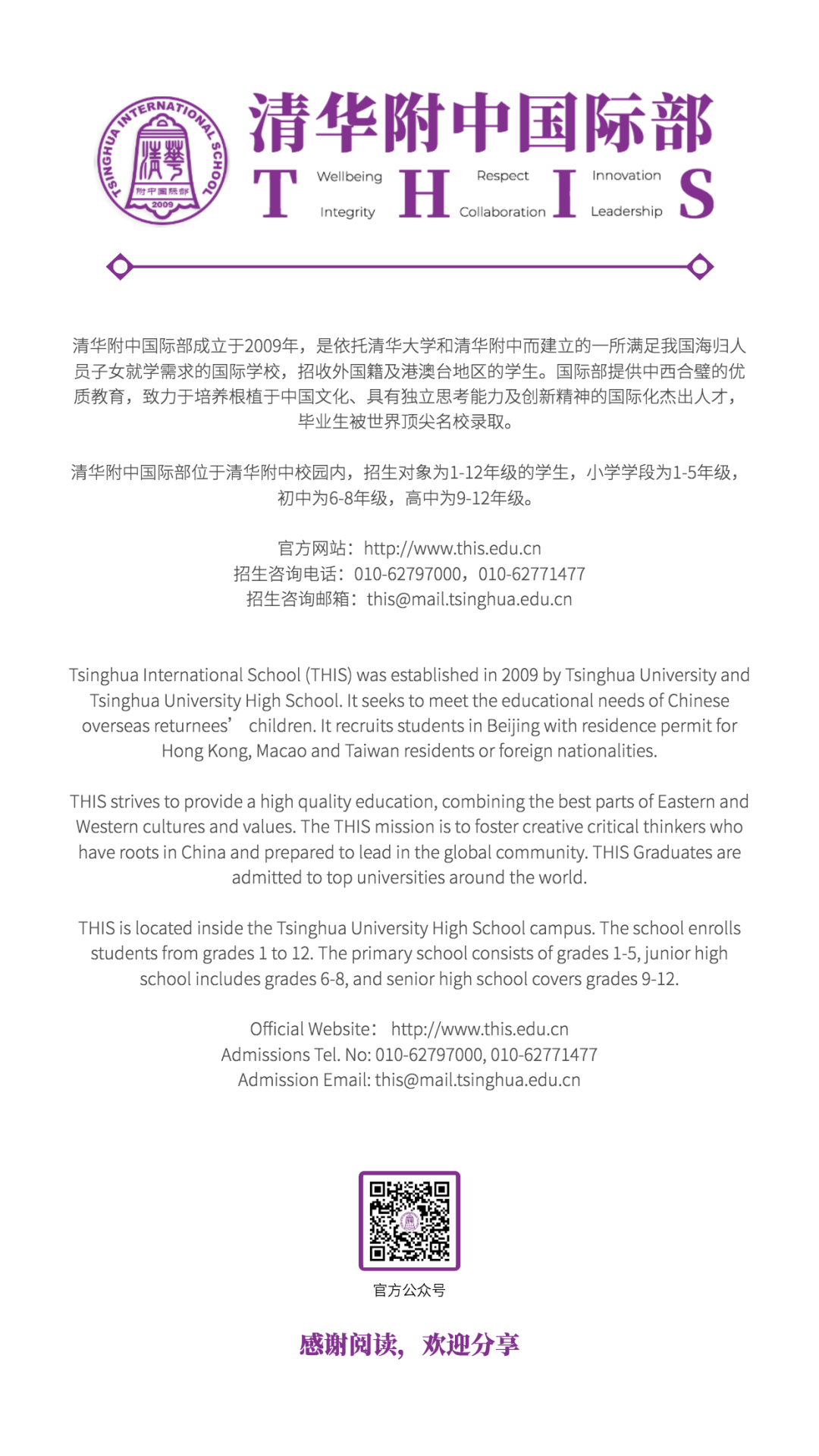
本篇文章来源于微信公众号: 清华附中国际部



